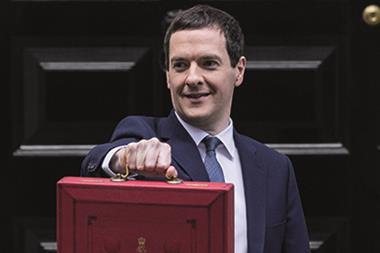Last week’s Budget saw developers at Mipim rushing to complete before midnight to avoid the stamp duty rise.

It was one of a number of surprises of which some, like the drop in capital gains and corporation tax and more on the reform of business rates, were welcome.
Others were not. The changes to the treatment of tax relief on interest will hit the industry hard despite it being obvious that developers were not the target. Charging loan costs to a UK entity in order to take advantage of interest relief in the UK has been a favourite tactic of multinationals, and it makes sense to close the loophole. The property industry relies on debt and this change may have wider implications than the Treasury had in mind.
But the Budget has, of course, been overshadowed by the bombshell resignation of the work and pensions secretary, Iain Duncan Smith. IDS insists his sole reason for leaving was the proposed reduction in Personal Independence Payments. The cuts were set to save circa £4bn by 2020-21. However, even before IDS’s exit, the backlash had started against the government. Within 24 hours, education secretary Nicky Morgan was insisting it was only a “suggestion” and subject to consultation. A more obvious example of hasty backtracking would be hard to find.
What was really surprising was that George Osborne’s sophisticated political antennae didn’t detect the ugly juxtaposition of several cuts in tax for the well-off and a cut in benefits for the disabled. It certainly undermined the oft-trumpeted slogan that ‘we’re all in this together’. Even the hardest heart would find it difficult to square taking large amounts of money from 640,000 claimants who the Institute for Fiscal Studies estimates would lose £3,500 a year while at the same time lowering the tax burden on corporations, on those in the 40% bracket and on the lucky recipients of capital gains.
The chancellor’s humiliation is now complete as new work and pensions secretary Stephen Crabb scrapped the proposal and went so far as to say there would be no more plans for big cuts in welfare. But the rift between IDS and the Cameron/Osborne axis remains deep, is clearly personal and is seemingly unbridgeable.
The former work and pensions secretary is a passionate reformer of our broken benefits system. He founded the Centre for Social Justice a decade ago, and even his opponents recognise he cares deeply about getting people out of welfare and into work. But the timing of his resignation, coming when the government was ready to reconsider, was extraordinary.
Whether he realised all this beforehand, he has damaged the chancellor’s prospects of succeeding his friend and prime minister David Cameron as leader and deepened the divisions within his own party, already far too evident as the debate over the EU rolls on. As one of the most fervent Brexiteers, Duncan Smith has also, of course, released himself to campaign even more fiercely in favour of the ‘leave’ camp.
None of this is going to help the current administration. Voters simply don’t like divided parties. It was not the only reason John Major lost in 1997 but it was a significant one.
There were many who assumed government would sail blithely to 2020 and then be effortlessly re-elected for yet another five years. With Brexit looming and the race to reach Number 10 even more open, there has seldom been a time when a week in politics was quite so disruptive.
Steve Norris is chairman of the National Planning and Infrastructure Association and of Soho Estates
































No comments yet